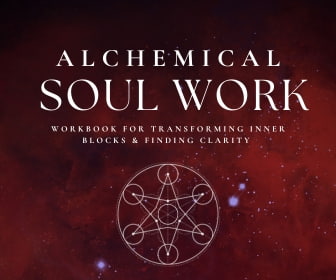Why do I refuse help from others? Why do I keep intentionally hurting myself? Why do I keep making the same mistakes over and over again?
How often have you asked yourself any of these questions?
Self-destructive behavior can be a daunting topic. It’s like a gremlin that lurks in the dark corners of existence, hiding in places we train ourselves to overlook and intentionally avoid.

Soul Work Compass Course:
Feeling lost, stuck, and trapped in repetitive cycles of pain? Discover your Soul's Compass to reclaim your purpose and find your path to freedom.
⭐️⭐️⭐️⭐️⭐️ "I have been a long-time subscriber to their website, and it’s one of my favorites by far ... It is rare to find this type of teacher." – Shar B.
But the more we put off facing our self-destructive behavior, the more it consumes us.
Are you ready to face the self-destructive parts of you? Remember that toxic behavior comes from only one part of you – it doesn’t define the whole of you.
(If you need more help after reading this article, I highly recommend checking out our Self-Love Journal and Shadow Work Journal to go deeper and help heal self-destructive tendencies.)
Table of contents
- What is Self-Destructive Behavior?
- Why Are We Self-Destructive? (+ My Experience)
- 17 Symptoms and Habits of Self-Destructive Behavior
- You’re Not Broken (You’re Just Human)
- Self-Destructive Behavior and the Journey of Self-Love
- How to Stop Being Self-Destructive (6 Pathways)
- Self-Destructive Tendencies Q&A
What is Self-Destructive Behavior?

Self-destructive behavior is any action carried out by an individual that causes them direct or indirect harm. This self-inflicted harm may be experienced on a physical, mental, or emotional level and creates immense suffering throughout their life. Examples of self-destructive behavior include workaholism, substance abuse, eating disorders, self-martyrdom, self-harm, and any behavior that negatively impacts a person’s life for which they aren’t actively trying to change or don’t feel worthy of overcoming.
Why Are We Self-Destructive? (+ My Experience)

I’m not the first, and I certainly won’t be the last person to admit that I’ve had self-destructive tendencies.
From pushing away the people I love and housing self-defeating mindsets to repeatedly self-harming in my teenage years, I’ve been down this dark alley more than once.
As I’ve grown, however, I’ve realized that self-destructive behaviors are an expression of the Shadow Self (aka, our ‘dark side’), which causes issues such as low self-esteem, low self-worth, and eventually self-loathing.
Want to get LonerWolf at the top of your Google search results?
While psychologists speculate that self-sabotaging behaviors could be coping mechanisms (i.e., to deal with stress, pressure, social demands, etc.), others consider self-destructive behavior as a way of maintaining comfort zones due to lack of confidence or feelings of unworthiness (e.g., staying at the familiar bottom of the social ladder).
17 Symptoms and Habits of Self-Destructive Behavior
Self-destructive behavior comes in many guises – some extreme, some more subtle.
Here are some of the most common symptoms and habits of self-destructive behavior:
1. Self-defeating mindsets
Self-defeating mindsets are typically unconscious forms of self-destructive behavior that result in self-fulfilling prophecies. Examples include harboring thoughts, usually on a subconscious level, such as, “I’m going to fail; I just know it,” “I’ll never get out alive,” “This will completely destroy me,” etc.
2. Failing to take action
Failing to take action may be passive, but it’s still self-destructive. When we know something is bad for us but fail to take any action or steps to remedy the issue, we are essentially setting ourselves up for (and guaranteeing) failure.
3. Over-eating
Over-eating usually appears as the habit of cramming ourselves full of sugary, fatty, and processed foods. This unhealthy habit can result in many long-term health issues (not to mention the short-term negative impacts on mood, sleep, creativity, etc.).
4. Under-eating
Many under-eaters fool themselves into thinking they’re benefiting themselves. The reality is that under-eating is usually a band-aid for serious self-image problems and other psychological issues.
5. Forced incompetence or over-committal
Forced incompetence means portraying yourself as unintelligent or incapable of successfully achieving something. This habit usually stems from a lack of confidence in your abilities and can function as a coping mechanism (e.g., to deal with academic pressure).
The opposite of forced incompetence is over-committal, where we commit to too many responsibilities, become “super capable,” and turn into workaholics, even though it burns us out and begins to feel soul-sucking very quickly.
6. Going out of your way to harm others
What goes around comes around, as they say, and the negative influence you have on others, whether by words or deeds, will eventually manifest in your own life (e.g., through sicknesses, tragedy, legal issues, isolation, etc.). On some level, we all know this truth, yet sometimes we go ahead and hurt others anyway.
Would you like to save this?
Your information will never be shared.
7. Physical self-harm
Physical self-harm is an extreme physical expression of self-destructive behavior. This practice is connected to low self-worth and the desire to cope with emotional pain in a physical way. Examples of physical self-harm include cutting, burning, and hitting oneself (or inciting others to do this to us, such as by intentionally provoking a fight). In extreme cases, physical self-harm can manifest as suicide attempts. (Please seek help from one of these hotlines if you do feel suicidal. There is always compassionate help available.)
8. Self-pity
Self-pity is an unconscious form of self-destructive behavior. It is destructive because it encourages us to remain inactive (i.e., wallowing in our misfortunes) rather than encouraging a proactive approach toward life.
9. Drug and alcohol abuse
Many people transform their anger into self-destructiveness—drinking their lives away or becoming oblivious in drugs or working too much. They make take it out on their children, employees, or animals. They may be passive-aggressive in a number of ways— being silent, uninvolved, offering insincere love and friendship, being available for people but making them suffer for it.
– Thomas Moore
A self-evident form of self-destructive behavior, drug and alcohol abuse creates endless misery in the lives of addicts and their friends and family members. Drug and alcohol abuse are usually connected to soul loss – or being disconnected from your soul.
10. Social self-alienation
While not always done consciously, social self-alienation is the act of deliberately isolating yourself from your peers. This could be through a variety of irritating, repelling, or antisocial behaviors that, on some level, you know are self-destructive.
11. Hiding from emotions
Failing to acknowledge negative (and sometimes positive) emotions creates a host of mental, emotional, and physiological illnesses. Hiding from emotions is another form of unconsciously manifested self-destructive behavior.
12. Refusing to be helped
Pushing away advice, refusing to go to rehab, avoiding the psychologist – all of these examples are signs of not wanting to be helped which is a reflection of the deep core belief that “I’m unworthy.” Refusing to be helped is a form of self-destructive behavior because it prevents growth and healing from occurring within you.
13. Unnecessary self-sacrifice
Some people are in love with their misery because that is all they have known for a large portion of their lives. Unnecessary self-sacrifice or being a martyr are good ways of making us feel “noble” and “altruistic” while masking the actual act of self-sabotage (which is giving up on the hopes, dreams, and passions that make us truly happy).
14. Spending too much
Whether through chronic gambling or constant Amazon purchases, overspending may seem unusual to include on this list, but it is nevertheless a form of self-destructive behavior that limits one’s freedom and peace of mind.
15. Physical neglect
Getting poor sleep, refusing to exercise, eating unhealthy food, and failing to maintain the general well-being of your body are all classic signs of common self-destructive behavior. Risky sexual behavior and poor personal boundaries are also a sign of physical neglect.
16. Mental neglect
Refusing, avoiding, or failing to confront your psychological health issues (e.g., stress, anxiety, depression, paranoia, OCD, etc.) delays the healing process, resulting in the perpetuation of long-term issues.
17. Sabotaging relationships
Sabotaging your relationships is a complex symptom as it involves many destructive behaviors such as jealousy, possessiveness, emotional manipulation, neediness, violence, and so forth. When we don’t feel worthy of love, we unconsciously manifest this in our relationships through the way we choose to behave.
You’re Not Broken (You’re Just Human)

If you identify with any or most of the above signs, you might feel your stomach sink, and a dark cloud of sadness or resentment may wash over you.
You might even start thinking that you’re fundamentally “broken” or that “something is severely wrong with you.”
But please understand that it’s normal to identify with many of the above signs. There’s nothing wrong with you. You’re not broken. You’re not a lost cause. You’re simply human. And that’s totally okay.
Why is it normal to possess many of the above self-destructive behavior signs? The answer is that most people have either been negatively programmed by their family or society or have unconsciously adopted these actions as a defense mechanism to protect against mental and emotional pain.
In other words, it’s not your fault and you aren’t to blame for your self-destructive behavior. But it IS your responsibility to work through it.
For over a decade, we've strived to make this website a haven of free, valuable information. Imagine a world where this knowledge wasn't readily available. If this post sparked a meaningful insight or helped you in any way, please consider a donation as a heartfelt "thank you" for keeping this resource free. Every contribution, big or small, allows us to keep giving back.
You didn’t choose to be self-destructive, did you? You didn’t think at some point, “Hmmm, I think I’m going to be self-destructive now,” did you? It’s just what happened.
The goal here isn’t to feel terrible about yourself. Instead, the goal is to see that “it is what it is” and find ways to reverse, undo, and overcome your self-destructive tendencies.
Self-Destructive Behavior and the Journey of Self-Love

The very fact that you’re here right now reading this guide is already a sign that you’re awakening out of the dream of self-destruction.
In other words, you’re starting to become more self-aware, and self-awareness is a sign that you’re spiritually awakening or at least you’re making self-care more of a priority in your life.
If you’ve been on a shadow work journey of working through your inner darkness, you may have come across some self-destructive behavior pattern within yourself, which is why you may find yourself here.
Going through the dark night of the soul is also another reason why you might find yourself exploring your self-destructive tendencies as you seek to find more meaning and deeper fulfillment in life.
Whatever the case, it’s helpful to understand that self-destruction is the opposite of self-love. And in many cases, our tendencies towards self-destructive behavior are totally unconscious and on autopilot because we were never taught how to love and value ourselves.
In the words of writer and speaker Alan Watts,
When you won’t love, or won’t let it out, it emerges anyway in the form of self-destruction. The alternative to self-love, in other words, is self-destruction. Because you won’t take the risk of loving yourself properly, you will be compelled instead to destroy yourself.
As such, we can see that learning how to love yourself is the antidote to self-destructive behavior.
How to Stop Being Self-Destructive (6 Pathways)
While I can’t give you a magical cure, I can give you some ideas, inspiration, and a few tried-and-tested paths to follow. Try all of these practices systematically or select a few and work with them consistently.
On average, it takes around 66 days to establish a new habit, according to what researchers have found. So make it your goal to stick with at least one of these activities for two months.
Here are the practices:
1. Grow your self-awareness by keeping a journal every day

Journaling has numerous mental health benefits, and it’s a powerful way of increasing your self-awareness. In fact, we could say that self-awareness is the most crucial ingredient in overcoming self-destructive tendencies! Read more about how to journal and the practice of self-awareness for more guidance. Our Self-Love Journal is a powerful place to begin if you want to get started right now.
2. Free yourself of compulsive, self-destructive behavior through meditation or mindfulness

There’s a reason why you keep hearing about these two practices, and it’s because they work! Even if you struggle to meditate traditionally, there are endless forms of mindfulness meditation out there that might spark your interest.
Examples of meditation/mindfulness activities include breathwork, walking meditation, mindful art therapy, chanting mantras, guided journeys, chakra visualization, etc.
If you don’t know where to start, I recommend downloading a meditation app such as InsightTimer, Calm, or Headspace. I started off with these apps, and they helped me tremendously. Bringing these key spiritual practices into your life can have profound benefits.
Try starting with 5-10 minutes in the morning or evening every day at the same time (to create a habit out of it).
Meditation and mindfulness are so effective because they help you to come back home to the present moment and create more inner space, which frees you from the compulsiveness and autopilot of self-destructive behavior.
3. Release your pent-up emotions by doing some emotional catharsis

Sometimes, the reason why we’re self-destructing is that a deeper emotion (such as anger, grief, or fear) isn’t being expressed.
Just think of a kettle: the more it boils, the more steam is released. But if that kettle had no way to release that steam, it would eventually explode! The same thing applies to you: you need a pressure valve, a way to channel your pent-up emotions.
When you don’t channel those buried emotions in a healthy way, they can come out in self-destructive behaviors.
So find something you enjoy doing that requires intense mental or physical effort. Examples include boxing, running, singing, dancing, creating art, or plain old screaming and crying (doing this privately is a good idea if you’re living with people!). One unconventional form of catharsis is called dynamic meditation.
4. Learn self-care and self-love through some simple habits

Self-love is a basic attitude of kindness toward yourself: it is the practice of taking care of your mental and emotional needs.
Self-care, on the other hand, is generally more oriented toward your body: it involves eating properly, getting enough sleep, drinking adequate water, wearing comfortable clothing, staying healthy, etc.
Both self-love and self-care go beautifully hand-in-hand as allies against self-destruction.
I understand that self-love may feel like a bit of a stretch for you, so if you want a place to start, begin with self-care.
Begin with even just one self-care practice each day and make it into a habit by doing it at the same time and same place.
For example, you could decide to take a morning walk at 7:30 am each day to help your body feel energized and relaxed. Or you could drink a cup of chamomile tea at the end of your day as a winding down self-care ritual.
You can find more ideas in my self-care ideas article. And if you’d like to practice self-love, I recommend my how to love yourself post, as well as our guided self-love journal.
5. Explore your core beliefs which are at the root of self-destructive behavior

Core beliefs are at the very root of self-destructive behavior because that which we think we often become. Whatever internal dialogue that runs around in our mind is often what dictates our behavior. After all, isn’t it true that we often act on what we believe to be true?

Stuck in the same old story?
Write a new one. The Alchemical Soul Work Workbook empowers you to become the alchemist of your own life. It provides the tools to dissolve old narratives and transform pain into power, giving you the freedom to create a future that is authentically yours.
For example, if you carry the core belief that “no one will ever love me,” you will unconsciously and perhaps sometimes intentionally behave in ways that alienate other people so that they don’t hurt you, therefore reinforcing your belief that “no one will ever love me” because you don’t give others the chance to even try!
Core beliefs can be tricky because they’re usually unconscious and automatic, and yet, once we shine the light of our awareness onto them, we can see through them, change them, and find more freedom and peace.
Examples of core beliefs that can result in self-destructive behavior include:
- I am bad
- I am unlovable
- I am unworthy
- I always hurt people
- I am stupid
- I am weak
- I don’t deserve happiness
Core beliefs often start with the words “I am …” and they can be discovered through reflection, inquiry, and journaling. You can find out how to pinpoint yours in my core beliefs guide.
6. Sometimes, there’s a limit to what you can do, and you’ll need to find a coach, counselor, or therapist

If you have strong self-loathing or intense self-destructive tendencies, you might not even have the impulse to take on board any of the advice in this article (*ding ding!* that’s another form of self-destruction, but it’s okay, you’re only doing what you’ve been unconsciously programmed to do).
As such, my best advice is to find a coach, counselor, or therapist ASAP. Sometimes the best thing is to see our true worth in the mirror of another. Sometimes we need someone to hold our hands and actively guide us in a 1-to-1 way.
If this is the case, your search engine is your best friend. Look up the keywords “self-destructive behavior counselor near me,” and you’re bound to find someone who can help. If you’re fine with online sessions via places like Zoom, just use a keyword like “help for self-destructive behavior therapy” or look up “therapy near me.”
There’s only so much an article on the internet can do to help you. While you’ve taken a wonderful step towards health and healing, seeking out guidance in the form of a therapist or counselor will aid you with ongoing support and tools. These, in turn, will transform your life little by little. And soon, you’ll be able to look back on this behavior with a gentle smile and a sigh of relief, proud of your ability to overcome and heal.
Self-Destructive Tendencies Q&A

There are many reasons why someone might be self-destructive. On an emotional and psychological level, self-destructive tendencies may arise from childhood trauma, negative social conditioning, and low self-esteem that are due to having unsupportive or abusive parents, family members, or peers. On a spiritual level, self-destructive tendencies are due to soul loss or the disconnection from your true and authentic essence.
Examples of self-destructive behaviors include excessive self-sacrifice, over-eating or under-eating, sabotaging close relationships, smoking or drinking too much, drug abuse, and self-harm.
The first step to overcoming self-destructive tendencies is to simply be self-aware of what’s happening. Journaling about your discoveries is a powerful place to begin. The next step is to practice self-care and self-love. Learning how to take care of your body and nurturing yourself on a mental and emotional level are crucial steps to overcoming self-destructive behavior.
Self-destructive thoughts are a product of low self-esteem and a part of us known as the inner critic. It’s crucial to remember that this is just one part of you, not the whole of you. You’re so much bigger than the self-destructive thoughts that randomly pop into your mind. Remember that we all get self-destructive thoughts from time to time (and you don’t need to believe them in the first place!), but you might just be more sensitive to believe them due to past trauma.
***
Self-destructive behaviors can be both conscious and unconscious – and they can end up sabotaging our health, happiness, and long-term well-being. But please remember that these harmful tendencies are a symptom of a deeper wound that needs to be shown compassion.
It’s important to remember that you’re not alone. Like me, you can probably identify with a couple or more symptoms of self-destructive behavior on this list. But when you take the first step on your healing journey of developing more self-awareness, self-care, self-forgiveness, and self-love, you will eventually be free of your self-destructive tendencies.
Don’t forget that if you need more help from now on with your self-destructive tendencies, our Self-Love Journal can help you with just that.
What are your experiences with self-destructive behavior? How did you learn to overcome them? I’d love to hear your stories below! Let’s help others not feel so alone.
Two paths to inner transformation – here’s how I can help you go deeper:
1. The Soul Work Compass Course: Feeling lost or stuck in repetitive cycles of pain? The Soul Work Compass Course is your guide to reclaiming your true purpose. In this deep yet practical journey, you’ll learn how to heal core wounds and create a tangible "Soul's Compass" to navigate life with clarity. Enroll now and find your True North!
2. The Inner Work Journal Bundle: Ready for deep transformation? This bundle includes three powerful journals – Self-Love, Inner Child, and Shadow Work – with 150+ prompts to heal wounds, integrate your darkness, and experience bone-deep change. Digital & printable. Print unlimited times.


 $3
$3

I read some testimonies about a love spell caster by Dr. KOKO on how he has helped lots of people in bringing back their ex lovers within 48hours, Sincerely I was just thinking if that was real and if this man could really help bring back my lover whom I love so much. I decided to contact him because I love my Girlfriend very much and we have been apart for a couple of months I really missed her so much, I have tried all other means to get her back but couldn’t.I contacted Dr.KOKO and he told me that my ex will come back to me in the next 48 hours,Dr. KOKO released her up to know how much i loved and wanted her. And opened her eyes to picture how much we have share together. My ex is now back to me again.As I`m writing this testimony right now I`m the most happiest Man on earth and me and my Girlfriend is living a happy life and our love is now stronger than how it were even before our break up.All thanks goes to Dr.KOKO for the excessive work that he has done for me by helping me to get back with my ex Girlfriend. I would like to drop Dr.KOKO mail address and hope you see this testimony and contact him if you have a lover that you really want back so badly, His mail: dr.kokolovespell34@gmail.com all call him +2347059008414
ALSO ADD HIM UP ON WHATSAPP TODAY +2347059008414
I read some testimonies about a love spell caster by Dr. KOKO on how he has helped lots of people in bringing back their ex lovers within 48hours, Sincerely I was just thinking if that was real and if this man could really help bring back my lover whom I love so much. I decided to contact him because I love my Girlfriend very much and we have been apart for a couple of months I really missed her so much, I have tried all other means to get her back but couldn’t.I contacted Dr.KOKO and he told me that my ex will come back to me in the next 48 hours,Dr. KOKO released her up to know how much i loved and wanted her. And opened her eyes to picture how much we have share together. My ex is now back to me again.As I`m writing this testimony right now I`m the most happiest Man on earth and me and my Girlfriend is living a happy life and our love is now stronger than how it were even before our break up.All thanks goes to Dr.KOKO for the excessive work that he has done for me by helping me to get back with my ex Girlfriend. I would like to drop Dr.KOKO mail address and hope you see this testimony and contact him if you have a lover that you really want back so badly, His mail: dr.kokolovespell34@gmail.com all call him +2347059008414
ALSO ADD HIM UP ON WHATSAPP TODAY +2347059008414
..,
It’s amazing how much I learned about myself in a few minutes, thank you for posting this article.
I’ve been struggling with this and already am getting a taste on what’s to come if I continue letting this wreak havoc on my life. I’ve destroyed some parts of my life (social suicide, being too needy, forced incompetence) and have lost friends and had to withdraw from college because of this problem. I’m done with this now and just want to live again.
While far from ideal, self-destructive decisions at times serve a grim
purpose- distraction from your primary source of pain with a secondary source that’s at least temporarily pleasurable.
People are sometimes quick to self-righteously say, well you need to focus on doing more for other people to feel happier and bringing something good to the world, then you won’t feel so empty and won’t get in your own way so much. What they don’t want to hear is that while helping others is important and a source of reward in and of itself, it doesn’t do one damn thing to ease the pain and hunger that led to the self-destructive urges in the first place.
“What they don’t want to hear is that while helping others is important and a source of reward in and of itself,” — yes, my thoughts exactly. Helping others is not selfless because we get something out of it (the reward of happiness, joy, good self-esteem). When you are in a place of self-hatred it is impossible to give others genuine love — only temporary conditional love. In my experience, it’s much better to work on yourself first.
At 44 yrs old, i don’t know how to stop the behavior.
Mental illness, drug and alcohol abuse runs in my family and have found the latter as a coping mechanism.
Suicide attempts, hospitalization, promiscuous behavior are also constants in my life.
I try so hard to hide all of this from everyone and feel i do a god job, but sometimes the only way to hide it is to hide from the world.
It’s nice to know about others and realize that I am not going through this alone.
Hi everyone, I am relatively new to all this. The reason for my interest in this website is because I have recently started to suspect my boyfriend of 7 mths is self destructive. He is also a social introvert which makes things a little harder as well. Suicide and alcohol addiction runs in his family.
He is very successful in his work and is a loyal and well respected friend to many however he constantly feels lonely, misunderstood, unworthy and has a habit of alienating himself when he lets himself fall into one of his depressive cycles. He abuses alcohol and although he wants to be healthy he keeps putting it off. He also sacrifices himself constantly for his friends and always feels like he is not worthy of my love.
I was wondering if it is a good idea to bring up my suspicions to him that i believe he may have self destructive tendencies? or will this maybe be a bad idea?
Thank you
I just got out of a 4 year long relationship with someone who had a cycle of self destructive behavior. I feel very upset and confused about the whole thing. In my heart I know it was the right decision. I was feeling very responsible for his happiness and at times his life. It was just too much. Do you have any suggestions for books for recovering from circumstances like this?
This is me…I really really need help :(
a couple months ago me and this guy started seeing each other; we talked on skype for 4 hours straight. when we were finaly able to meet i desperately wanted to be a better person for him and me. it was all going good; every day we texted each other on the way home from school (he lived far away) every week or so we would randomly message each other happy ‘… week anniversary’ just for the hell of it. But on one saturday i woke up at 3 in the afternoon and one thought made me nearly cry myself to sleep; i didnt love him anymore. i ended the relationship several weeks after that and regretted for months, its time i stopped wallowing in the past and stop hating my self and actually put my life together; starting today…